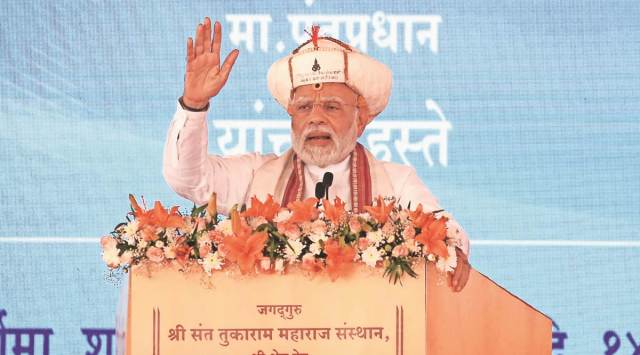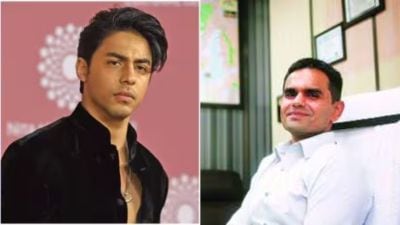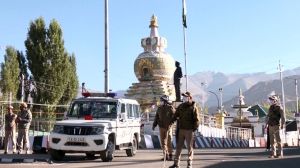PM: India has held open, healthy discussions on difficult social topics, need to strengthen this
The PM, while lauding the role played by the media during the Covid-19 pandemic, said that while the media has the right to criticise and point out shortcomings of the government, it has an equal responsibility to report positive news.
 Prime Minister Narendra Modi at the inauguration of shila (rock) temple at the Sant Tukaram Maharaj Mandir at Dehu near Pune on Tuesday. (Express Photo by Rajesh Stephen)
Prime Minister Narendra Modi at the inauguration of shila (rock) temple at the Sant Tukaram Maharaj Mandir at Dehu near Pune on Tuesday. (Express Photo by Rajesh Stephen)Amid growing unrest across the country, Prime Minister Narendra Modi on Tuesday said that while open and healthy discussions on most difficult social topics has been a practice in India, it needs to be strengthened.
Speaking at the Dwishatabdi Matohsav (200th anniversary) of Mumbai Samachar, a Gujarati daily, at Bandra-Kurla Complex in Mumbai, the PM, while lauding the role played by the media during the Covid-19 pandemic, said that while the media has the right to criticise and point out shortcomings of the government, it has an equal responsibility to report positive news.
“For thousands of years, we have conducted healthy debate, healthy criticism and right reasoning as a part of the social system. We have open and healthy discussions on very difficult social topics. This has been the practice in India, which we have to strengthen. This country is a country of rich tradition that is carried forward through the medium of debates and discussions,” he added.
On a day-long trip to Maharashtra, the PM also inaugurated the Jal Bhushan Building and Gallery of Revolutionaries at Raj Bhavan in Mumbai.
Maintaining that indifference is shown towards the unsung heroes of the country, he added that this has continued for a very long time. He recited how freedom fighter Shyamji Krishna Varma’s ashes had to wait for a long time to reach India, till he brought them back.
The function was attended by Governor Bhagat Singh Koshyari and Chief Minister Uddhav Thackeray among others.
Amid ongoing bitter relation between the Shiv Sena and the BJP in Maharashtra, this is the first time in over four months that Thackeray shared the dais with Modi. The CM had skipped some of the PM’s previous visits to the city and the state.
Addressing the inauguration function, the PM said that Maharashtra has inspired the country in many fields and there is a very rich legacy of social reformers from Sant Tukaram Maharaj to Babasaheb Ambedkar.
He added that from Maharashtra, Dhyaneshawar Maharaj, Sant Namdev, Sant Ramdas and Sant Chokhamela have infused energy into the country. “If we talk of Swarajya, the lives of Chhatrapati Shivaji Maharaj and his son Chhatrapati Sambhaji Maharaj strengthen the sense of patriotism in every Indian even today.”
The PM noted the inclusion of ancient values and memories of freedom struggle in the architecture of Raj Bhavan and praised the spirit of turning Raj Bhavan into Lok Bhavan.
“Knowingly or unknowingly, we limit India’s independence to a few incidents, whereas India’s independence involved the tapasya of countless people and the collective impact of many incidents at the local level was national. The means were different but the resolution was the same.”
He noted that irrespective of social, family or ideological roles, the place of the movement, whether within the country or abroad, the goal was one – complete independence for India.
The PM recalled the contribution of Lokmanya Bal Gangadhar Tilak, the Chapekar brothers, Vasudev Balwant Phadke and madam Bhikaji Cama. He also pointed out that the freedom struggle spanned locally as well globally. He cited the Gadar Party, Netaji Subhash Chandra Bose-led Azad Hind Fauj and India House of Shyamji Krishna Varma as examples of the global scale of the freedom struggle. “This spirit of from local to global is the basis of our Aatmanirbhar Bharat Abhiyan,” he added.
“The role of Veer Savarkar in India’s freedom movement was immense. One must go to Andaman and Nicobar Islands to see the struggle and atrocities inflicted in prison. Students should be taken to such places to draw inspiration from our freedom fighters,” the PM said.
He added that while Mumbai is the city of dreams, there are many such cities in Maharashtra that are going to be the growth centres of the country in the 21st century. “With this thinking, on one hand, the infrastructure of Mumbai is being modernised and at the same time, modern facilities are being increased in other cities as well.”
The PM released a stamp on the occasion. “While lending voice to pre and post freedom movement, Mumbai Samachar has always retained its credibility. The write-ups appeared were often referred and cited by even Mahatma Gandhi and Sardar Patel,” he said.
Referring to the power of regional languages, the PM said, “Under the influence of foreigners, when the city became Bombay, even then Mumbai Samachar did not leave its local connect and connect with the roots. It retained its identity as Mumbai Samachar… It is not just a newspaper but a heritage, expression of India.”
Praising the Parsi community for their contribution, the PM said, a 1,000-year-old civilisation has shown how Maa Bharati embraces whoever comes to this nation. “Everybody has opportunities to flourish in her lap. What better example than the Parsi community? The community’s contribution in freedom movement to Navnirman Bharat is huge. It is one of the smallest in terms of population – micro community. But in terms of contribution and service, it is huge.”
He added that every institution has a particular role to play for the betterment of the society, be it the media or the legislature.
Earlier in the day, inaugurating the shila (rock) temple at the existing Sant Tukaram Maharaj Temple at Dehu near Pune, the PM said that “wari” — the annual pilgrimage undertaken by ‘warkaris’ or devotees — has inspired the country’s forward march. He said his government was ensuring that India’s “vikas” (development) and “virasat” (heritage) move ahead together.
“It is our responsibility to keep our ancient identity and traditions alive at a time when modern technology and infrastructure are becoming synonymous with the country’s development,” he added while addressing the gathering.
Reciting abhangs of Sant Tukaram which drew thunderous applause from the ‘warkaris,’ the Prime Minister pointed out that even Veer Savarkar, while in jail, used his handcuffs as instrument and sang ‘abhangs’. “When Savarkar was jailed during the freedom struggle, he used his handcuffs as musical instrument and sang the devotional poetry of Sant Tukaram,” Modi said.
“Through his devotional poetry, Sant Tukaram described class discrimination as the biggest sin. It is this message that the wari seeks to spread among the masses. The country is also drawing inspiration from the message sent out by wari by following the principle of ‘Sabka Saath, Sabka Vikas’,” he said.
Stating that India was one of the oldest living civilizations in the world, the Prime Minister said, “If the credit for this goes to anyone, it is to the saint tradition and sages of India… India is eternal because it is the land of saints. In every era, some great soul has descended to give direction to our country and society.”







